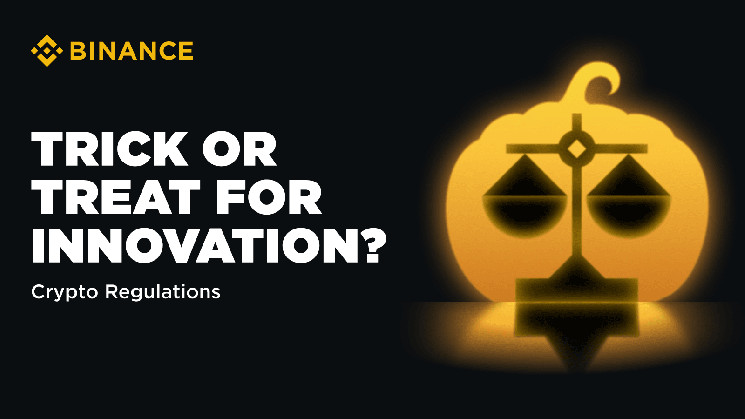Main Takeaways:
-
Regulation can light the way for growth, boosting trust and sparking innovation in the crypto world.
-
Too much regulation might cast a shadow over innovation, but when regulators and the crypto community stir the pot together, they can concoct a potion that nurtures balanced growth.
-
Binance’s proactive approach shows that compliance and innovation can thrive side by side, even in the ever-changing landscape of cryptocurrency.
As we journey into the enchanted world of crypto this Halloween, one topic still gives the community chills — government regulation. But is this fear well-founded? Are these regulations protective spells, or are they chains holding crypto back? Let’s unwrap this candy to uncover the truth.
Curse or Blessing?
For many in the crypto community, regulation looms like a haunted house — full of uncertainty and potential pitfalls. In the early days, crypto attracted tech-savvy individuals who were dissatisfied with traditional finance, seeing it as a centralized, opaque system that was difficult to trust due to its record of poorly managed crises and persistent systemic power imbalances. Crypto was thus the potion that these early adopters sought — a transparent system where power was distributed more broadly.
As crypto gains mainstream acceptance and starts weaving its way into the fabric of traditional financial systems, regulation creeps in like the cautious steps of trick-or-treaters approaching a spooky, unfamiliar house. But just like that house, regulation isn’t something to be feared — it’s a natural part of crypto’s evolution. Rather than casting a shadow of doom, regulation can act as a guiding light, protecting consumers and adding legitimacy to the space.
Think of regulation as the invisible spell that strengthens trust and stability in the crypto world. By setting clear rules and protective measures, it conjures a safer environment where users can explore without fear, drawing more participants into the fold. And with those safeguards in place, the most innovative projects can thrive — unhindered by threats lurking in the dark.
Far from being a curse, embracing regulation helps balance the ideals of decentralization with the need for consumer protection. In doing so, it bridges the gap between these worlds, lighting the path for a vibrant, sustainable crypto ecosystem where creativity and security can coexist.
Crafting Crypto Regulations: A Global Spellbook
As regulators across the globe shape their strategies, each nation brews its own potion for governing crypto. The European Union, with its Markets in Crypto-Assets (MiCA) regulation, is conjuring a unified set of rules across the continent, creating a framework that protects investors while fueling innovation. This approach lays down clear pathways for crypto to thrive, much like a well-lit trail through an otherwise shadowy forest.
Over in Asia, countries like Japan and South Korea wasted no time preparing for the rise of crypto. Japan has long embraced crypto as a payment method not denominated in fiat currency, while South Korea has woven strict laws to enhance transparency and security. These early, decisive moves show that regulation doesn’t have to be a ghoul lurking in the shadows as it laid the foundation for mass adoption and innovation.
Then, there’s El Salvador, making headlines with its daring leap by adopting BTC as legal tender. This bold dive proves that when crafted wisely, government policy can push the limits of what’s possible, sparking financial growth and inclusion in places that need it most. Just like a well-cast spell, the right wave of regulation can unlock new worlds of opportunity.
Can Innovation Survive the Regulatory “Haunting”?
As governments tighten their grip on cryptocurrency regulations around the world, some in the crypto community might feel a shiver down their spine. The big fright? Too much regulation could stifle innovation — the “lifeblood” that propels the crypto space forward.
Strict rules are like cobwebs that could trap new startups before they spread their wings, slowing the creation of groundbreaking blockchain technologies. Many in the community value decentralization and privacy — two key aspects of blockchain — and fear that overregulation could snuff them out. Like the grip of a cursed hand, heavy regulation could weaken the sector’s global competitiveness by scaring off talented developers and entrepreneurs.
Adding to this fear is the concern that regulators might not fully grasp the complex, decentralized nature of blockchain. If the rules don’t align with how the technology actually works, they could become more of a burden than a blessing, haunting the industry instead of nurturing its growth.
The solution? A little magic called collaboration. Regulators and crypto experts need to come together, stirring their ideas into a potion that balances consumer protection with the need to keep innovation bubbling. Only then can the industry thrive without being haunted by excessive regulation.
Carving a Path Through Compliance
As regulations evolve, companies like Binance are finding ways to stay ahead of the curve while keeping the spirit of innovation alive. Binance has made significant investments in compliance, growing its team from 500 to 700 members and boosting its compliance budget to over $200 million. These efforts demonstrate that regulation doesn’t have to spell the end of innovation — it can actually be a crucial part of crypto’s journey forward.
Binance has recently secured its 20th global license with India’s Financial Intelligence Unit, another milestone highlighting how the company is able to brew compliance with innovation. By aligning with regional legal frameworks, Binance builds trust while staying nimble enough to continue innovating. This achievement proves that regulation and innovation can coexist, paving the way for a future where crypto is both regulated and revolutionary.
Final Thoughts: Fear Not — The Future is Bright
As the fog of uncertainty around crypto regulation thickens, it’s easy to feel spooked. But instead of fearing the unknown, the crypto community should embrace regulation as a tool to protect its future. Crafting the perfect regulatory framework is like carving a pumpkin — it takes precision, patience, and a steady hand. When done right, it can illuminate the path forward, ensuring both security and space for innovation.
Binance’s efforts to lead in compliance while working closely with regulators demonstrate that it’s possible to adapt to the shifting landscape without losing the spark that makes crypto so exciting. The message is clear: regulations don’t have to haunt the crypto world — they can help shape a future where innovation and safety go hand in hand.
So this Halloween, don’t be scared of regulation. Instead, see it as a treat that, with the right balance, can unlock endless possibilities for the future of cryptocurrency.
Further Reading
-
Crypto Regulation Across Borders: Insights from the Second Digital Innovation Academic Forum
-
MiCA Stablecoin Rules: What They Mean and How Binance Is Complying
-
Building Trust in the Crypto Ecosystem: A Framework For Centralized Exchanges
Read the full article here









